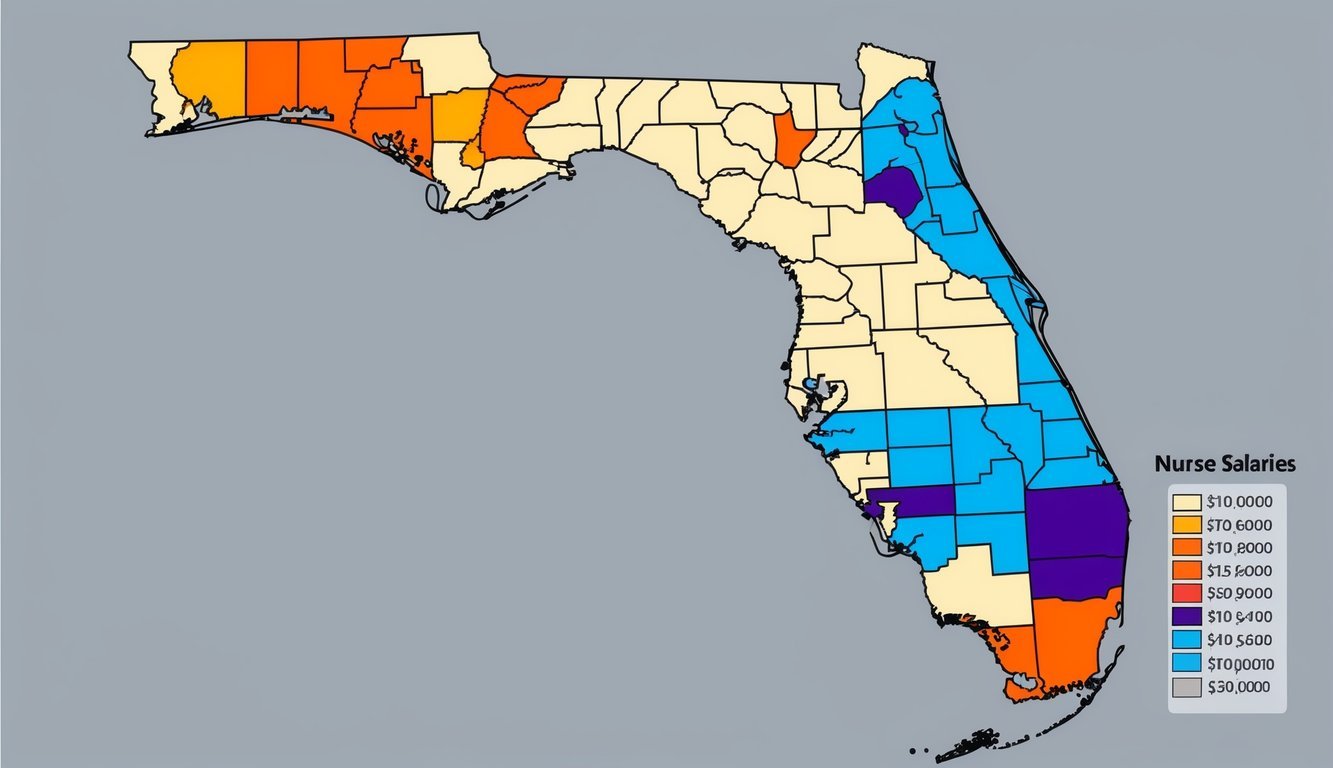If you’re considering a career as a nurse in Florida, you need to understand the salary landscape. Registered nurses in Florida earn an average of approximately $67,639 per year.
Their hourly wages are around $34.62.
However, these figures depend on factors such as location, experience, and specific healthcare settings.
Salaries can vary significantly between cities and employers.
For instance, urban areas may offer higher pay rates to attract qualified candidates, while rural settings might present different compensation packages.
Additionally, pursuing specialized certifications can enhance your earning potential in this competitive field.
Florida’s healthcare sector is growing rapidly.
By 2030, it is projected to need over 216,510 new registered nurses.
This demand suggests job security, opportunities for advancement, and salary growth within your nursing career.
For more detailed insights into the salary variations across different regions, you can explore resources like NursingProcess.org or Indeed.
Overview of Nursing Salaries in Florida
Nursing salaries in Florida are influenced by various factors such as experience, education, location, and market demand.
Understanding these elements helps you better assess your earning potential within this vital profession.
Factors Influencing Nurse Salaries
Several key factors determine how much you can earn as a nurse in Florida.
-
Experience and Education: Your years of experience significantly affect salary. Generally, more experienced nurses tend to earn higher wages. Additionally, advanced degrees like a BSN or MSN can lead to increased earnings.
-
Location: Salaries can vary by region. Urban centers often offer higher pay due to a higher cost of living, while rural areas may have lower salaries.
-
Specialization: Nurses with specialized skills or certifications typically command higher salaries. Fields such as critical care or anesthesia often offer premium pay.
-
Cost of Living Index: Florida’s cost of living can impact salary levels. Areas with higher living costs usually provide better compensation to attract qualified staff.
Comparison with National Averages
As of 2024, the average salary for Registered Nurses in Florida is around $77,710, which is lower than the national average of $89,010.
The following table highlights key salary comparisons:
| Metric | Florida | National Average |
|---|---|---|
| Average Annual Salary | $77,710 | $89,010 |
| Hourly Wage | $37.35 | $42.80 |
| Projected Job Growth (2018-2028) | 16.1% | 9% |
Nursing salaries in Florida are expected to rise significantly.
The Bureau of Labor Statistics predicts a salary growth projection of 21.72% from 2023 to 2027, reflecting the increasing demand for qualified nursing professionals in the state.
Salaries Across Nursing Roles in Florida
In Florida, nursing salaries vary significantly based on the role and level of expertise.
Below are detailed salary insights for different nursing positions, emphasizing key information that can help you understand the financial landscape of nursing in the state.
Registered Nurse (RN) Salaries
As a Registered Nurse in Florida, you can expect an average salary of approximately $72,000 annually.
However, this figure can fluctuate based on several factors, including your location, experience level, and the type of healthcare facility you work in.
Salary Breakdown:
| Percentile | Annual Salary | Hourly Wage |
|---|---|---|
| 10th Percentile | $47,040 | $22.60 |
| 50th Percentile (Median) | $72,000 | $34.62 |
| 90th Percentile | $112,094 | $53.83 |
For further insights into the salaries for RNs in Florida, visit NurseJournal.org.
Advanced Practice Registered Nurse (APRN) Salaries
Advanced Practice Registered Nurses, which include roles such as Nurse Practitioners and Nurse Anesthetists, typically earn higher salaries than RNs due to their specialized training.
The average salary for APRNs in Florida is about $94,000 annually.
Key Factors:
- Experience: More experienced APRNs earn significantly more.
- Specialization: Certain specialties, like anesthesia, command higher salaries.
For more detailed information on APRN salaries, check Nurse.com.
Nurse Practitioner (NP) Salaries
Nurse Practitioners in Florida earn a mean salary of approximately $99,000 per year, significantly surpassing the average for RNs.
Your specific earnings can depend on your area of practice, whether in primary care or a specialized field.
Earnings Breakdown:
| Experience Level | Annual Salary |
|---|---|
| Entry-Level | $85,000 |
| Mid-Career | $95,000 |
| Experienced | $115,000 |
For more on Nurse Practitioner salaries, refer to NursingProcess.org.
Nurse Anesthetist Salaries
Nurse Anesthetists represent one of the highest-paid nursing roles in Florida.
Their average salary typically reaches around $150,000 annually.
The complexity and responsibility of the role contribute to this high earning potential.
Salary Insights:
- Top Earners: Experienced Nurse Anesthetists can earn upwards of $175,000.
- Job Demand: The increasing need for anesthesia in medical procedures enhances the demand for this specialty.
For additional details on Nurse Anesthetist salaries, visit AllNurses.com.
Impact of Education and Certification on Salaries

Your education level and certifications significantly influence your earning potential as a nurse in Florida.
The distinctions between degrees and the value of certifications can lead to considerable salary variations.
Associate Degree in Nursing (ADN) vs. Bachelor of Science in Nursing (BSN)
The choice between an ADN and a BSN can impact your salary.
An ADN generally requires two to three years of education, while a BSN takes four years.
| Degree Type | Average Salary (Annual) |
|---|---|
| ADN | $60,258 |
| BSN | $79,910 |
Registered nurses with a BSN tend to earn higher salaries compared to those with an ADN.
Additionally, a BSN may open doors to leadership and specialized positions, enhancing job security.
Investing in a BSN can lead to better job prospects and a higher salary potential over your career.
Certifications and Specializations
Certifications also play a crucial role in determining your pay.
Specialized certifications can lead to significant salary increases.
For instance, certified Nurse Practitioners (NPs) in Florida earn an average of $107,600 annually.
| Certification | Average Salary (Annual) |
|---|---|
| Certified Nurse Practitioner | $107,600 |
| Certified Registered Nurse Anesthetist | $163,300 |
Pursuing certifications in specialty areas showcases your expertise and commitment to advanced nursing practice, making you more valuable in the job market.
These credentials can lead to promotional opportunities and higher compensation in various healthcare settings.
Geographical Variations in Nurse Salaries within Florida

Nurse salaries in Florida are influenced by various geographical factors.
Understanding these can help you make informed decisions about your career as a Registered Nurse (RN) in different settings across the state.
Effect of Urban vs. Rural Settings
In Florida, urban areas typically offer higher salaries for nurses compared to rural settings.
This difference is often due to the concentration of healthcare facilities and the demand for qualified staff.
For instance, cities like Miami and Orlando may pay RNs an average of $77,710, whereas rural areas might see averages closer to $60,000.
Here’s a quick comparison:
| Area Type | Average RN Salary |
|---|---|
| Urban | $77,710 |
| Rural | $60,000 |
In metropolitan regions, you may encounter various specialty positions that command even higher wages.
Meanwhile, rural nurses often face greater responsibilities due to smaller team sizes but may receive less compensation.
This disparity makes location a critical factor in salary considerations.
Florida’s Cost of Living and Its Impact on Salaries
The cost of living in Florida varies significantly between urban and rural areas.
Higher living costs in cities like Tampa or Jacksonville often correlate with elevated nurse salaries.
You might find that housing, transportation, and everyday expenses are notably higher in urban locales.
A rough estimate of the Cost of Living Index (COLI) for different regions includes:
| City | Cost of Living Index | Average RN Salary |
|---|---|---|
| Miami | 123 | $77,710 |
| Orlando | 112 | $75,000 |
| Tampa | 103 | $72,500 |
| Jacksonville | 100 | $70,000 |
This index indicates that as the cost of living increases, so too does the average RN salary.
Understanding these factors can help you align your career plans with your financial goals and living preferences.
Career Outlook for Nursing in Florida
The nursing profession in Florida presents promising opportunities, including stable job security and significant growth projections.
As healthcare demands increase, specialized areas like ICU are seeing heightened demand, ensuring that nursing careers remain robust and rewarding.
Job Security and Growth Projections
Nursing in Florida is characterized by strong job security, bolstered by a projected job growth rate of 16.1% from 2018 to 2028, surpassing the national average of 9%.
According to the Bureau of Labor Statistics, the state currently employs around 187,920 Registered Nurses, with a need for an estimated 216,510 nurses by 2030.
Factors Contributing to Growth:
- Aging Population: As the population ages, healthcare needs rise, necessitating more nursing professionals.
- Healthcare Facilities Expansion: New hospitals and clinics are continually opening, creating additional RN positions.
With an average RN salary of approximately $72,000 per year, this field offers financial viability alongside job stability Registered Nurse Salary in Florida.
Demand in Specialized Areas like ICU
The demand for specialized nursing roles is growing rapidly, particularly in the Intensive Care Unit (ICU).
Nurses in ICU settings are critical in managing complex patient cases.
These cases often require advanced skills and training.
Key Aspects of ICU Nursing Demand:
- Advanced Skill Set: ICU nurses need specific training in critical care, enhancing job appeal.
- Competitive Salaries: Nurses in these roles may earn higher wages than general RNs. This reflects their expertise and the demand in critical care.
As hospitals expand ICU capacities, you can expect increased job openings for qualified ICU nurses.
This specialty not only offers competitive compensation but also the chance to make a significant impact on patient care.
For more insights on this dynamic opportunity, refer to NurseJournal’s outlook.

